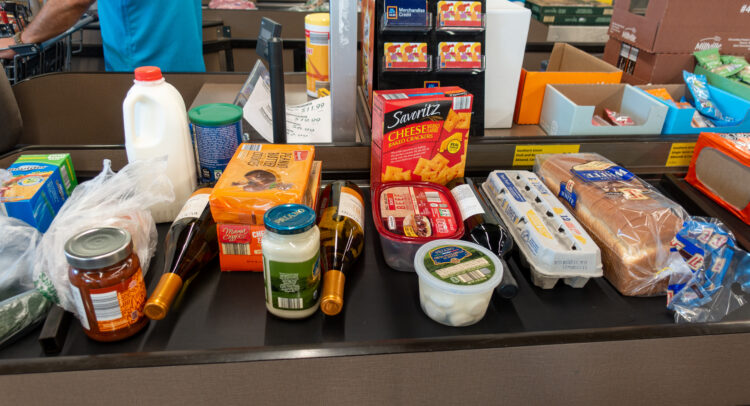Consumer staples companies may struggle to maintain profits as consumers become increasingly savvy with their shopping habits. However, what may be a welcome victory for everyone who shops to survive has negative implications for the companies they buy from.
As a result, the trend of discount prices by various companies is particularly interesting to investors who have taken shelter in consumer goods in light of fears of a weakened economy. Lower margins threaten current corporate profits, particularly for consumer staple giants.
Weaker Pricing Power
Over the past couple of years, consumers have been grappling with relentless price hikes on everyday essentials. Shoppers are now getting a reprieve as new statistics show the tide seems to be turning. Food and packaged goods companies, where demand is considered constant regardless of price, have now embraced discounts, coupons, and strategic promotions to maintain sales.
Data from NielsenIQ paints a clear picture; in the U.S. alone, promotional activity has surged, with 28.6% of products sold with promotions in the past year compared to 25.1% just three years ago. This trend is mirrored in Europe, another crucial market for many American consumer groups.
Different brands in the industry are feeling the pinch. General Mills (NYSE:GIS), the household name behind Cheerios and many other breakfast cereals, is ramping coupon discounting by 20% for its new fiscal year. Its CEO, Jeff Harmening, acknowledges the need for sharper pricing strategies.
Similarly, Mondelez (NASDAQ:MDLZ), the company behind ageless brands like Ritz crackers and Toblerone chocolates, is facing a particularly challenging year in the U.S., especially with budget-conscious consumers. Luca Zaramella, Mondelez’s CFO, highlighted price adjustment strategies, with certain larger sizes of its Chips Ahoy cookies being brought back below the $4 psychological price point.
Consumer Spending Habits Are Changing
The rise in promotional activity reflects a shift in the power dynamic. Carman Allison, vice president at NielsenIQ, explains, “The number of items being promoted has jumped 6.3% year-over-year. This suggests manufacturers’ and retailers’ ability to raise prices has been somewhat depleted.” Allison emphasizes the power of the purse: “Consumers are making choices with their wallets. If prices rise too aggressively, they’ll switch brands or stores.”
However, not all brands are impacted equally. Some companies are finding success by focusing on specific segments. Foot Locker (NYSE:FL) CEO Mary Dillon reports that its customers remain willing to pay full price for particular products. Similarly, Nike (NYSE:NKE) emphasizes its strategy of “maximizing full-price sales.”
Procter & Gamble (NYSE:PG), the consumer goods giant behind recognized brands like Tide and Charmin, highlights the importance of brand loyalty. CFO Andre Schulten argues that consumers are unlikely to switch to unproven alternatives for essential products. “They don’t want to take a chance,” says Schulten. “Consumers are choosing brands that guarantee quality and performance.”
Key Takeaway
While the cool-down in inflationary pressures relieves consumers, it presents a challenge for corporations, particularly those in the consumer staples sector. The ability to raise prices freely seems to be diminishing, forcing companies to get creative with promotions and potentially impacting profit margins. The coming months will test the adaptability of these corporations as they navigate a landscape where consumer price sensitivity reigns supreme.

